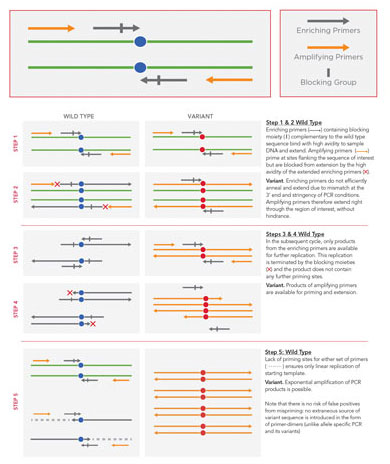Enriching Mutations from Limited Samples

Complete the form below to unlock access to ALL audio articles.
Introduced last year, PointMan™ DNA enrichment technology from EKF Diagnostics, has been shown to be sensitive enough to enable the use of a blood sample to assess the mutation status of a cancer patient. With recent studies demonstrating that the sensitivity of PointMan is far greater than existing PCR technology, it is clear to see that this technology holds great promise.
To learn more about PointMan, the collaboration with the University Swansea and what the future holds, we spoke to Gary Dowthwaite PhD, Product Manager at EKF Molecular Diagnostics and the company's CEO, Andrew Webb.
AB: Can you tell us a little about EKF Molecular Diagnostics and the PointMan DNA enrichment technology?
Gary Dowthwaite (GD): Working in partnership with the healthcare industry, EKF Molecular is providing superior molecular diagnostic technologies to support personalized medicine. EKF Molecular has a rapidly growing portfolio of PointMan DNA enrichment kits to detect mutations in clinically actionable target genes such as KRAS, BRAF, EGFR, NRAS, JAK2 and ESR1. Utilising the ultra-sensitive and specific PointMan technology, the enrichment kits are the ideal research tool or in vitro diagnostic, for understanding the relationship between biomarker and drug response.
PointMan DNA Enrichment kits are a highly sensitive and selective tool offering the ability to enrich mutated sequences from both limited solid tissue sample and liquid biopsy. PointMan DNA Enrichment kits works by enhancing the DNA sample for the point-mutated sequence using a simple reagent set (see figures 1 and 2) combined with standard DNA extracts and running on a real time thermocycler platform. The enriched PointMan product can then be used in combination with standard downstream detection methods, such as PCR, pyrosequencing and Sanger sequencing.

Figures 1 and 2
AB: What advantages does PointMan offer over other technologies such as allele specific PCR?
GD: Unlike allele specific PCR, PointMan DNA Enrichment does not require separate primers/probes for each mutation within any given codon. For example, there are in excess of 20 mutations in codon 19 of the EGFR gene which are enriched by a single PointMan reaction. This reduces the number of reactions and thus cost, of detecting these mutations. Additionally, the PointMan enriching primers effectively block wild type amplification and as a consequence the potential miss-priming associated with allele specific PCR is avoided.
AB: Recent results from your collaboration with the Institute of Life Science at the University of Swansea, suggest the possibility of a simple blood test for cancer, can you tell me more about this study and the next steps?
GD: Using samples from the Wales Cancer Bank, Dr Ricardo Abascal’s group at the ILS, Swansea, used PointMan DNA enrichment to detect BRAF and KRAS mutations in both solid tumour derived DNA from FFPE (formalin fixed and paraffin embedded) tissue and from the blood of the same melanoma patient. Additionally, Dr Abascal’s group have used PointMan Enrichment to detect BRAF mutations in both tissue samples and the blood of endometrial cancer patients. At present, this data showing concordance between blood and tissue sample provides proof of concept that mutations associated with both cancer types have the potential to be detected in blood. EKF Molecular and ILS, Swansea are working together to increase the sample numbers and define standard operating procedures for DNA extraction and enrichment.
AB: What steps are needed before this technology can move to the clinic?
Andrew Webb: The data accrued to date is very much the first step on the road to proving the clinical utility of blood based assays using PointMan DNA Enrichment. Whilst initial diagnosis of cancer will remain within the realm of the pathologist, it is envisioned that disease monitoring during treatment and even in remission, will be facilitated by PointMan technology. As such, we are seeking partners to initiate clinical trials to determine the clinical utility of PointMan in monitoring the effectiveness of the next generation of targeted therapies.
AB: Currently PointMan is used to work with oncology biomarkers. Are there any plans to focus on other disease areas in the future?
GD: Pharmaceutical companies are increasingly utilising genetic data to develop targeted therapies outside oncology. As such, EKF Molecular Diagnostics are investigating utilising PointMan DNA enrichment in the diagnosis, prognosis and treatment monitoring of other disease areas where the ability to detect rare sequences will be of advantage over existing technology and provide for improved patient outcome.
Gary Dowthwaite and Andrew Webb were speaking to Ashley Board, Managing Editor for Technology Networks. You can find Ashley on Google+ and follow Technology Networks on Twitter.

